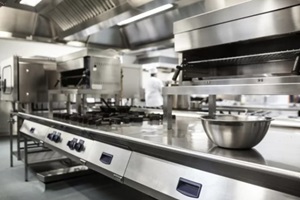 Restaurant owners face many operational risks, threatening their businesses’ financial stability and longevity. Food spoilage and equipment failure stand out as major concerns as they disrupt business operations, leading to loss of revenue.
Restaurant owners face many operational risks, threatening their businesses’ financial stability and longevity. Food spoilage and equipment failure stand out as major concerns as they disrupt business operations, leading to loss of revenue.
Restaurant insurance is an integral asset for the risk management of these premises as it assures coverage for possible losses. This grants owners peace of mind, allowing them to focus on running their operations.
This article will discuss how restaurant operators can tackle food spoilage and equipment failure using restaurant insurance.
The Impact of Food Spoilage and Equipment Failure in Restaurants
When equipment failure or food spoilage occurs, especially during peak hours, restaurants experience significant shifts in their operations.
The loss of inventory and assets is a direct financial setback by itself. The inability to serve customers also leads to decreased patronage and affects the restaurant’s reputation.
Equipment failure also requires inspections and repairs/replacements. At the same time, food spoilage may lead to food safety issues, often resulting in costly lawsuits.
Insurance coverage can help mitigate the financial impact and the reputational damage that comes with it.
Navigating Restaurant Insurance: Coverage Essentials for Your Business
Restaurants can get insurance to protect them from financial loss from food spoilage due to unexpected power outages, contamination, natural disasters, and mechanical breakdowns.
This type of insurance helps cover the cost of lost inventory and revenue. Restaurant operators who take out an equipment failure insurance policy get coverage against unexpected equipment breakdowns.
These include malfunctioning refrigerators and cooking equipment failures. This type of insurance can help cover repair and replacement costs and loss of income during the downtime.
Equipment failure insurance may also cover losses incurred due to spoilage of perishable goods resulting from equipment breakdown, similar to spoilage insurance.
In addition, some policies cover the costs of diagnosing the cause of equipment breakdown. Some equipment failure policies may cover additional expenses incurred to mitigate the impact of equipment breakdown.
These costs include rental fees for temporary equipment, and outsourcing affected services.
Customizing Your Coverage: Matching Insurance With Your Restaurant’s Needs
Restaurant insurance is highly customizable. This allows operators and owners to tailor coverage to the unique needs of their businesses.
 For example, they can choose coverage for specific types of equipment highly susceptible to breakdown or food spoilage risks that may be more prevalent for their business.
For example, they can choose coverage for specific types of equipment highly susceptible to breakdown or food spoilage risks that may be more prevalent for their business.
Restaurant operators should consider the size, location, type of their establishment, the specialized equipment in their possession, and the nature of their operations.
For example:
- A large fine dining restaurant with high-end kitchen equipment may require more comprehensive equipment failure coverage than a small café with basic cooking equipment.
- Restaurants in areas prone to natural disasters may require more coverage for food spoilage insurance.
- Restaurants dealing with more perishable food items, such as seafood, will require extensive spoilage insurance.
Restaurant operators should regularly review their insurance policies as business needs and operations change.
That way, they can update their coverage accordingly. For instance, if new equipment is added or new menu items are introduced, coverage may need to be updated to ensure full protection.
Proactive Measures: Minimizing the Risk of Spoilage and Equipment Issues
Insurance is a statistic-driven business. That means actuaries and underwriters calculate premiums based on the risk associated with your business.
As such, restaurant owners should strive to minimize risks for the best rates and coverage. Also, insurance is meant to cover unexpected events, not damages that could have been prevented.
Regular equipment maintenance and proper food storage and handling can minimize these risks.
Implementing Effective Maintenance and Storage Practices
Effective equipment maintenance practices include:
- Schedule regular maintenance checks for all equipment.
- Train staff on the correct use of equipment.
- Keep a record of maintenance and repairs done on each equipment.
Adequate food storage and handling procedures include:
- Train employees on proper temperature control and storage methods for different types of food.
- Implement a first-in, first-out (FIFO) method of inventory management to avoid food spoilage.
- Regularly check expiration dates.
- Rotate perishable items regularly.
Learning From Experience: Real-life Cases and Insurance Claims
 The Chipotle Mexican Grill food contamination case that left over 1,100 people sick between 2015 and 2018 is an example of a food spoilage case that resulted in lawsuits and financial losses.
The Chipotle Mexican Grill food contamination case that left over 1,100 people sick between 2015 and 2018 is an example of a food spoilage case that resulted in lawsuits and financial losses.
The company had to pay $25 million in fines to enter a deferred prosecution deal and suffered considerable reputational damage. Insurance helped in mitigating these financial losses.
Secure Your Restaurant’s Future With Pro Insurance Group
The seasoned agents and insurance advisors at Pro Insurance Group have the expertise and resources to help you choose the right coverage for food spoilage and equipment breakdowns at your restaurant.
They also help with comprehensive coverage for bars and restaurants by offering general liability, workers’ compensation, and product liability policies. Contact Pro Insurance Group today for a customized restaurant insurance policy.
